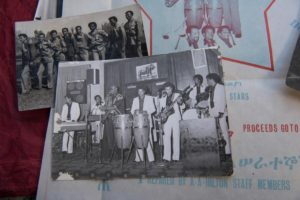By Avery L. White

Left: Photo collage by a fan (unknown) at the Hilton Hotel, late 1960s. Right: Hailu Mergia today.
In the 60s and 70s, Hailu Mergia was a famous musician in Africa. But famine in the 80s forced him to move to the US. Now he’s poised for a comeback.
As a young man living in Addis Ababa during the swinging 60s, Hailu Mergia was a superstar. The Ethiopian capital city was a bustling cosmopolis where art and culture flourished amid the country’s uneasy quest for independence.
His jazz and funk band, The Walias, performed for the domestic and international elite at the then-prestigious Hilton Hotel’s music club, which granted residencies to Ethiopia’s hottest bands. Crowds of dignitaries and foreign diplomats, Hollywood movie stars, famous musicians like Duke Ellington and Alice Coltrane, and important African figures like Manu Dibango would flock to the hotel to dance and jam until sunrise.
“When we played in the Hilton Hotel, the audience was full of people from around the world, so everybody had requests for different kinds of music. Sometimes we’d play Indian melodies, sometimes we’d play Arabic music. We’d pick up American soul, blues and jazz melodies and then improvise on them in our own music,” Mergia remembers.
Born in the Ethiopian countryside in 1946, Mergia spent much of his childhood working as a shepherd, but began learning to play music as a boy scout at age 14. When his band rose to prominence in the 60s and 70s, they weren’t just kings of Addis Ababa nightlife, they were a beacon to Ethiopia’s revolutionaries. Under the Derg regime, constant warfare, famine, and brutal political oppression plagued Ethiopia.
The Walias’s seminal album Tche Belew features the single “Musicawi Silt,” one of the most famous songs of all-time in Ethiopia. It conveys messages of heroism through well-known references to Ethiopian battle songs. “Ethiopian music is like most art: in every piece there’s a message. Everyone is trying to explain what they know through music. Tche Belew is a hero’s song. It means ‘go for it,’” says Mergia.

Left photo: First photo ever taken of The Walias band, Zoo Park in Addis Ababa, 1963. Center photo: Mergia and The Walias with Manu Dibango, The Hilton Hotel Ballroom, early 1960s.
The album’s call for bravery proved apt. During the “Red Terror” over a half million Ethiopians were killed and countless more displaced. The constant state of crisis led to the nation’s first major diaspora into the western world, with the United States experiencing a surge in refugees.
In 1981, as his country entered one of the worst famines it had ever endured, Mergia made the painful decision to leave Ethiopia, abandoning his fame to move to the United States. He eventually settled in Washington, DC, where he’s been driving a cab for the last 20 years. “To give up fame and music was hard, but I always had a feeling that one day I’d make my way back to it again,” Mergia says.
Over the years in the States, Mergia managed to intermittently self-release a few tapes and CDs, but little of it reached his fans in Ethiopia. “Every once in a while someone in my cab sees my license and they know my name. Usually they have no idea I was famous,” he says.
Though Mergia is far from his home country, he keeps music close to him as he navigates the streets of DC. “I have a keyboard in the trunk of my taxicab,” he says. In between fares, Mergia pulls it from his trunk to practice in the backseat. “My keyboard works with batteries, so I always have music.”

Mergia playing a battery-powered keyboard in the back of his taxicab.
In 2013, music scholar and archivist Brian Shimkovitz was in Ethiopia digging through cassettes in the back of a record shop when he found one of Mergia’s old tapes. “I was super excited about it and I listened to it over and over,” Shimkovitz says. “So I tracked [Mergia] down on the internet.”
Shimkovitz runs Awesome Tapes from Africa, a blog and record label he started in his Brooklyn apartment in 2006. “The label grew out of the blog’s attempt to show what African music really sounds like in various regions, not a packaged world music version of it,” Shimkovitz explains. “The label tries to put out music other labels wouldn’t release, while doing 50/50 deals and advocating for the artists. Sending them money and opportunities as much as possible is the central mission. [Our] fans are people all over the world who are adventurous or curious listeners or music collectors or African expats.”
Like many of his fans, Shimkovitz was surprised to hear that Mergia was driving a cab. “I used to live in DC, so I was aware of the large Ethiopian community and their role in making that city work. So I guess I was surprised that a famous musician was doing a day job. But I can’t say I was shocked, as the live music scene is difficult as hell for any musician in the US, especially someone playing instrumental music,” says Shimkovitz.
Shortly after they met, Shimkovitz signed Mergia with Awesome Tapes’ label and began booking him shows around the world. “We never have any big disagreements and the work has been successful so I guess that helps make things really fun. He’s my dad’s age. Not the age of someone I typically hang with and get along with so effortlessly. We have had beautiful times just goofing around while driving through the desert in Texas, or hanging on a boat backstage at a show in Germany, or watching him play Radio City Music Hall opening for Beirut,” Shimkovitz says.
This February, Mergia will release his first album in more than 15 years. “Lala Belu has been a long time coming,” Shimkovitz notes.
“All of it feels like a big comeback,” says Mergia. “A different kind of audience, playing with a different kind of band and working with a different kind of record company. The album is very different from all the albums I did after I left Ethiopia.”
When asked why he decided to release a new album, Mergia replies, “Art is a lifetime commitment. The more you play the more you know.”
After so many years out of the spotlight, Mergia’s drive to keep playing music—even if it meant practicing in the backseat of his taxi—perhaps reminded him of the message he sang in 1977: that one must “go for it.”
Source: Vice


